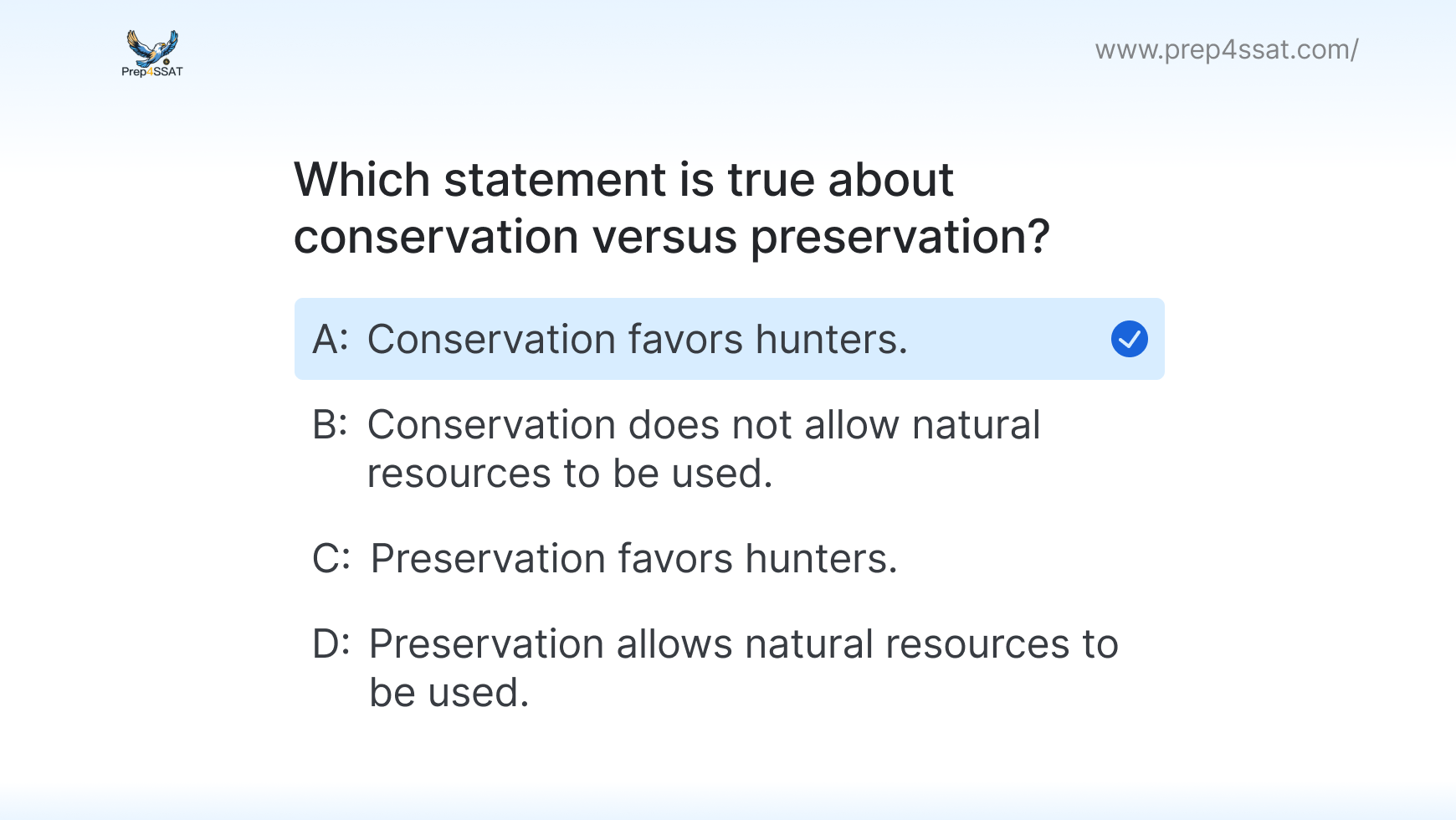
Which statement is true about conservation versus preservation?
Question
Which statement is true about conservation versus preservation?
a. Conservation favors hunters.
b. Conservation does not allow natural resources to be used.
c. Preservation favors hunters.
d. Preservation allows natural resources to be used.
Answer:
a. Conservation favors hunters.
Brief Explanation:
Conservation focuses on the sustainable use and management of natural resources, allowing activities like hunting while maintaining ecological balance. Preservation, on the other hand, seeks to protect nature from use, keeping ecosystems undisturbed.
Extended Knowledge:
Conservation Principles:
- Sustainable Use: Encourages responsible use of resources to ensure availability for future generations.
- Support for Wildlife Management: Hunting, fishing, and controlled use of resources align with conservation efforts to maintain population balance.
Preservation Principles:
- Strict Protection: Aims to keep ecosystems and wildlife in their natural state, often prohibiting activities like hunting or resource extraction.
- Minimal Human Impact: Preservation seeks to maintain environments untouched by human influence.
Question 1
Which of the following best describes the goal of conservation?
a. To protect natural resources from any human use.
b. To manage natural resources for sustainable use.
c. To restore natural habitats to their original state.
d. To eliminate human impact on the environment.
Answer:
b. To manage natural resources for sustainable use.
Brief Explanation:
Conservation seeks to balance environmental protection and human needs by managing natural resources responsibly to ensure sustainability.
Question 2
Which practice aligns with the principles of preservation?
a. Sustainable logging in designated forests.
b. Establishing a wildlife sanctuary with restricted access.
c. Regulated hunting seasons for population control.
d. Implementing crop rotation in agriculture.
Answer:
b. Establishing a wildlife sanctuary with restricted access.
Brief Explanation:
Preservation emphasizes protecting environments from human activity, often creating areas with restricted or no human interaction to maintain ecosystems.
Question 3
How does conservation differ from preservation in terms of resource use?
a. Conservation prohibits all resource use; preservation allows limited use.
b. Conservation allows sustainable use; preservation prohibits resource use.
c. Both conservation and preservation allow sustainable resource use.
d. Both conservation and preservation prohibit all resource use.
Answer:
b. Conservation allows sustainable use; preservation prohibits resource use.
Brief Explanation:
Conservation supports the responsible and sustainable use of natural resources, while preservation seeks to protect nature by minimizing or preventing human use.
Question 4
Which statement accurately reflects the philosophy of preservation?
a. Natural resources should be utilized to benefit society.
b. Human activities should be integrated into natural processes.
c. Nature should be protected from human use to maintain its intrinsic value.
d. Environmental policies should focus on economic development.
Answer:
c. Nature should be protected from human use to maintain its intrinsic value.
Brief Explanation:
Preservation focuses on protecting the natural world from human interference, valuing ecosystems and biodiversity for their inherent worth.
Extended Knowledge:
Conservation vs. Preservation:
- Conservation: Involves sustainable resource use to meet human needs while protecting environmental integrity for future generations.
- Preservation: Aims to maintain ecosystems in their untouched state, prioritizing nature's intrinsic value over human utility.
Historical Context:
- Conservation rose in the late 19th century, focusing on resource management.
- Preservation evolved as a movement to protect nature from industrialization and urbanization.